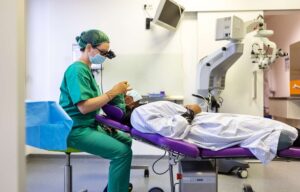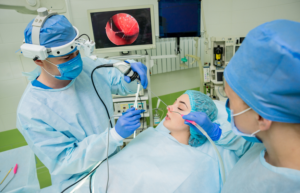Today, almost four out of ten surgeries are performed on an outpatient basis and more and more health establishments are developing these practices. But what is outpatient surgery?
“Day surgery is surgery for which the patient does not sleep in the hospital” explains Doctor Allal, orthopedic surgeon at the Clairval private clinic in Marseille. his operation.
What are the conditions for outpatient surgery?
Those with serious comorbidities, heart problems, will only more rarely undergo outpatient operations” specifies the surgeon.
However, there are a few conditions for undergoing these operations, as the French association of outpatient surgery writes:
have a telephone and be able to understand and apply care instructions (no language barrier and easy hygiene at home);
be able to be accompanied the evening of your surgery (provide two people to accompany a child under 10 who has been operated on);
do not remain alone (apart from certain cases) the first night after general anesthesia. It is quite possible and even recommended to spend the first night with a relative (family, neighbor or friend), at your place or at his place.
What place for outpatients in France?
According to the Ministry of Solidarity and Health, “overall day surgery activity is progressing in France: it represented 37.7% of surgical activity in 2010 compared to 32.3% in 2007”. Ambulatory surgery is progressing in France even if it is practiced mainly by private establishments.
It facilitates and improves the management of surgery, in a multidisciplinary framework bringing together all health professionals including the surgeon, the anesthetist and the attending physician. All care is taken care of before the operation and helps to reduce the patient’s anxiety. At the same time, the anesthetist surgeon adapts the operating strategy so as to be the least invasive possible. In practice, during the installation of a prosthesis, the RAAC allows the patient to take his first steps as soon as he returns to the room in the first hours following the intervention” explains Doctor Allal.
How is patient care carried out?
After the decision has been taken for the operation, “you will first meet the surgeon, then the anesthesiologist, who will decide with you whether this operation should be scheduled in an “Day Surgery Unit” (UCA). You will choose a date together and receive instructions to prepare at home. A booklet, sometimes called an outpatient surgery passport, will be given to you. It will include information about your care in the day surgery unit. Other documents may be given to you to prepare for your discharge, according to the APHP website (public assistance hospitals in Paris).
The day before the operation
The day before the operation, the nurse contacts the patient to tell him the time at which he will have to come to the hospital and at which time he will have the operation. “The ideal is to operate on the patient in the morning so that he can go out in the evening,” explains Doctor Allal.
The day of the operation
When he arrives at the health establishment, he is welcomed by the nursing staff. before going to the treatment room. He then returns to his locker room. The patient goes step by step with faster care” adds the surgeon.
What types of interventions can be performed on an outpatient basis?
Many operations can be carried out on an outpatient basis, even the heaviest ones such as the fitting of a total hip or knee prosthesis, for example. But operations such as cataract surgery, dental extraction, knee arthroscopy, varicose vein surgery or the operation of the adenoids and tonsils are the most commonly performed.
A general anesthesia can very well be part of an outpatient procedure” recalls the surgeon.
What are the advantages ?
“Day surgery allows the patient to quickly return to his usual living environment and to streamline the turnover of hospital beds” specifies Doctor Allal.
This type of care also makes it possible to reduce the patient’s presence in a hospital environment and therefore to limit exposure to nosocomial infections, that is to say infections contracted during a stay in a health establishment. On the side of the medical teams, day surgery optimizes the organization of resources while reducing the cost for the hospital and social security.
How to prepare for your outpatient procedure?
To best prepare for your operation, the French Association for Ambulatory Surgery (afca) recommends:
Make sure to bring your complete medical file with a recent prescription for your treatment on the day of your surgery or anesthesia consultation.
Read the instructions given to you carefully.
Do not hesitate to write down the questions you have so that you do not forget to ask anything on the day of your consultation. All questions are good to ask, there are no superfluous questions. There are, however, many questions that we forget to ask.


